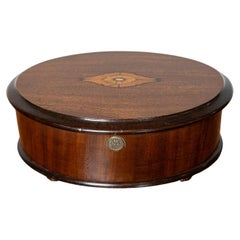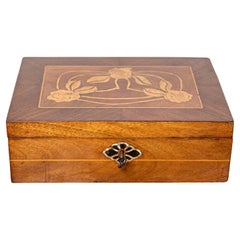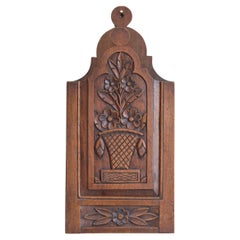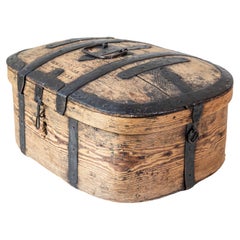Video Loading
Want more images or videos?
Request additional images or videos from the seller
1 of 9
Swedish 1880s Burr Walnut Sarcophagus Form Partitioned Sewing Box from Gnesta
Price:$1,170
$1,450List Price
About the Item
- Dimensions:Height: 6.25 in (15.88 cm)Width: 10.5 in (26.67 cm)Depth: 7.25 in (18.42 cm)
- Materials and Techniques:
- Place of Origin:
- Period:
- Date of Manufacture:circa 1880
- Condition:Wear consistent with age and use. This is an antique and having been around for a long time, it will show signs of wear. Antique pieces have very much sought-after character and associated flaws. Please review photos for condition & contact us with questions!
- Seller Location:Atlanta, GA
- Reference Number:Seller: XXG5301stDibs: LU835932296392
About the Seller
5.0
Platinum Seller
Premium sellers with a 4.7+ rating and 24-hour response times
Established in 1982
1stDibs seller since 2007
1,044 sales on 1stDibs
Typical response time: 1 hour
Authenticity Guarantee
In the unlikely event there’s an issue with an item’s authenticity, contact us within 1 year for a full refund. DetailsMoney-Back Guarantee
If your item is not as described, is damaged in transit, or does not arrive, contact us within 7 days for a full refund. Details24-Hour Cancellation
You have a 24-hour grace period in which to reconsider your purchase, with no questions asked.Vetted Professional Sellers
Our world-class sellers must adhere to strict standards for service and quality, maintaining the integrity of our listings.Price-Match Guarantee
If you find that a seller listed the same item for a lower price elsewhere, we’ll match it.Trusted Global Delivery
Our best-in-class carrier network provides specialized shipping options worldwide, including custom delivery.You May Also Like
Early 19th Century Rosewood Sarcophagus Form Sewing Box
Located in Philadelphia, PA
Early 19th Century Rosewood Sewing Box. This beautiful and large box has a simple elegance, with its bombe, sarcophagus form and beautifully grained rosewood. The exterior is decorat...
Category
Antique Early 19th Century English Regency Decorative Boxes
Materials
Rosewood
19th Century Victorian Burr Walnut Casket Sewing Box
Located in London, GB
This is a superb quality antique Victorian burr walnut casket, sewing box, with elaborate decorative brass and bronze mounts, circa 1860 in date.
The rectangular lid is beautifully decorated with cut brass mounts centred with a striking bronze sphynx...
Category
Antique 1860s English Victorian Decorative Boxes
Materials
Brass, Ormolu
Grand Tour Bronze Sarcophagus Form Box
Located in Stamford, CT
Unusual 19th century Italian Grand Tour bronze box in the form of a sarcophagus, circa 1880. Nice form, handsome desk-top accessory, great addition to any box collection.
5.5 inches...
Category
Antique Late 19th Century Italian Grand Tour Decorative Boxes
Materials
Bronze
1880s, European Sterling Silver Box
Located in Tarrytown, NY
Solid sterling European box. 4.25 ounces. Sun, basket of fruit, flowers adorn the top of the box. Gold wash inside.
Category
Antique 1880s Decorative Boxes
Materials
Sterling Silver
A Walnut Parquetry Sewing Box
Located in Sheffield, MA
The square box with slant top fitted with pin cushion surrounded in parquetry of stained walnut, on toupie feet
Category
Antique 18th Century and Earlier German Boxes
Regency Tea Caddy of Sarcophagus Form Burr Yew c1820
By Tunbridge Ware
Located in Tunbridge Wells, GB
Heading :Regency tea caddy of Sarcophagus form in burr yew c1820
Date : c1820
Period : Regency
Origin : England
Decoration : Sarcophagus form in rosewood. Four brass ball feet. T...
Category
Antique 1820s British Regency Tea Caddies
Materials
Wood
Antique Ladies Utility Box, English, Burr Walnut, Writing Slope, Sewing, Regency
Located in Hele, Devon, GB
This is an antique lady of the house utility box. An English, burr walnut and mother of pearl inlaid writing slope and sewing box, dating to the late Regen...
Category
Antique Mid-19th Century British Regency Decorative Boxes
Materials
Walnut
$2,614
H 5.91 in W 11.82 in D 8.67 in
19C Anglo Indian Highly Carved Sadeli Mosaic Sarcophagus Sewing Box
Located in Dallas, TX
PRESENTING A GORGEOUS 19C Anglo Indian Highly Carved Sadeli Mosaic Sarcophagus Sewing Box.
Made in Bombay, India circa 1860-80.
Box made of sandalwood with highly carved teak wood reliefs and panels on all sides.
Edged with bone and ebony veneers and glorious sadeli mosaic, made from tiny pieces of faux ivory, pewter, green semi-precious stone.
The box is in a sarcophagus form with domed lid.
The original brass carry handles are on the sides.
The interior is in great condition and consists of a removeable mirror under the lid portion, with the original red velvet lining behind it.
The base is removeable and contains a number of lidded compartments.
6 of the interior lids on the base, are each inlaid with sadeli mosaic banding. The rest are also carved and chased.
The interior is fully complete with 7 lidded faux ivory/bone, thread canisters with sadeli domes and the original bone thimble.
The box sits on 4 brass ball or bun feet with the original velvet lining on the base.
Some minor repairs and losses, but this box is fully complete. This is ‘rare’ as many of these boxes have not survived in such condition!
Included in the sale are 2 photos that were in the box (under the base tray). Interestingly, one of them is a view of downtown Nassau, New Providence (Bermuda) from the early 20C and stamped on the rear. What a ‘journey’ this piece has made! Made in India … travelled to Bermuda, probably via Britain … back to Ireland (where we bought it) …. then to Texas!
These boxes were made by superb Indian craftsmen, specifically for sale to the ruling British elite. These types of boxes, carved padouk and sandalwood, (whilst beautiful and superbly crafted) were of a lesser quality, than the more profusely and intricately mosaic inlay, tortoiseshell and ivory boxes, made for the British ‘Upper Classes’ in the areas of Bombay and Vizagapatam. These type of boxes were much more affordable back in 1880 (and indeed today) and would probably have been bought by mid-level diplomats, civil servants or visitors.
Sewing boxes (in general), were in EVERY Victorian home in Britain in the 19th Century and like other boxes etc were ‘status symbols’ of your place in society! The more ornate the box, the more ‘Upper Class’ you were!
Of it’s type, this one, is one of the very higher quality one’s, than the norm!
SADELI MOSAIC: “Anglo Indian boxes were made in India for the English residents from the early part of the 18th century. They were brought back or sent back to England usually by the people who had commissioned them. From the beginning of the nineteenth century they were imported more commercially, although not in any significant numbers until the middle decades. They were very highly valued, especially the early ones, to the extent that the designs were copied on late 19th and early 20th century tins.
The ancient art of Sadeli Mosaic is said to have been introduced from Shiraz in Persia via Sind to Bombay, a long time before the Anglo Indian boxes were made. It was a technique, which required a high degree of skill and patience. It was executed very lavishly, in that the frequent cuts wasted a great amount of the precious materials used. The workmanship was however more than commensurable to the value of the materials.
Ivory, silver, pewter (or other metals), wood and horn were cut into faceted rods which were bound together to form geometric patterns. When the glue has set, the rods were sliced in transverse sections. This gave the maker a number of angled circular pieces in the original pattern. Several variations of patterns could be achieved by combining the materials in different ways. The ivory was sometimes dyed green to give an extra color.
The mosaic pieces in a combination of patterns, often separated by ivory, ebony, horn or silver stringing were used to veneer sandalwood boxes. In the early boxes, which date from the turn of the 18th to the 19th century, there are large panels of mosaic covering tops and sides of boxes. It took incredible skill to cover such large areas without any shakes or wavering of the pattern. The corners and joins on these boxes are impeccably matched.
The makers (reputed to be Persian) of Sadeli mosaic made in the first two decades of the 19th century displayed a total understanding of the qualities of the different materials they used. They combined substances, which can expand and contract according to atmospheric conditions with others, which are hard and unyielding. The result was a sharp definition of the lines and patterns, which made up the whole design.
On the early boxes the designs look deceptively simple. The fact is, they emerged from a culture, which had mastered geometry and understood how to generate a pattern from a set number of points. The patterns are so harmoniously combined that their incredible complexity is not immediately apparent.
The earliest Sadeli boxes...
Category
Antique 19th Century Indian Anglo-Indian Decorative Boxes
Materials
Bone, Sandalwood, Teak
$1,250
H 5.5 in W 12.8 in D 9.15 in
Antique Mahogany jewelry box 1880s England
Located in Den Haag, NL
Very nice Antique solid mahogany jewelry box, comes with a
Blue Velvet interior . and a Mirror in the lid of the box .
Ideal for your watches . Good condition .
Category
Antique 1880s English Victorian Decorative Boxes
Materials
Mahogany
Rare Restored Burr Walnut & Tunbridge Inlaid Sewing Work Box Table Carved Feet
Located in West Sussex, Pulborough
We are delighted to offer for sale this stunning fully restored heavily carved Victorian walnut sewing table with ornately inlaid Tunbrid...
Category
Antique 19th Century English Victorian Side Tables
Materials
Walnut
$1,883 Sale Price
30% Off
H 28.15 in W 20.28 in D 15.16 in
More From This Seller
View All19th Century Danish Box Circa 1880
Located in Atlanta, GA
This elegant 19th-century Danish box, circa 1880, is an exceptional example of refined craftsmanship. Its round, curved shape is crafted from richly polished mahogany, highlighting t...
Category
Antique 19th Century Danish Victorian Decorative Boxes
Materials
Walnut
19th Century Danish Box Circa 1880
Located in Atlanta, GA
This exquisite 19th-century Danish box, dating to circa 1880, showcases the elegance and craftsmanship of the era. Made from warm walnut wood, the box features a finely inlaid floral...
Category
Antique 19th Century Danish Art Nouveau Decorative Boxes
Materials
Walnut
French 19th Century Carved Walnut Farinerio Decorative Box with Floral Decor
Located in Atlanta, GA
A French Provençale carved walnut farinerio decorative box from the 19th century with floral motifs. This petite French box, called a fariniero, was intended to be used to coat fish,...
Category
Antique 19th Century French Decorative Boxes
Materials
Walnut
Swedish 1790s Rustic Oval Top Wooden Box with Iron Accents and Distressed Patina
Located in Atlanta, GA
A rustic Swedish wooden box from the late 18th century, with iron accents and natural patina. Created in Sweden during the last decade of the 18th century, this wooden box charms us ...
Category
Antique Late 18th Century Swedish Rustic Decorative Boxes
Materials
Metal
English George III Period Early 18th Century Walnut Box with Brass Hardware
Located in Atlanta, GA
An English Georges III period walnut box from the early 18th century with slanted lid and brass hardware. This exquisite English George III period walnut box from the early 18th cent...
Category
Antique 18th Century English George III Decorative Boxes
Materials
Brass
18th Century Italian Box
Located in Atlanta, GA
This stunning 18th-century Italian box is a fine example of Baroque artistry, embodying the period's characteristic grandeur and attention to detail. Crafted from rich walnut, the bo...
Category
Antique 18th Century Italian Baroque Jewelry Boxes
Materials
Walnut
Recently Viewed
View AllMore Ways To Browse
Walnut Sewing Box
Antique Sewing Storage
Velvet Pin Cushions
Silver Rectangular Box
Antique Satinwood Box
Art Deco Shagreen Box
Powder Boxes
Sevres Box
Antique Decorative Eggs
Crystal With Lid
Ivory Box
Antique Dressing Box
Antique Paper Mache Hand
Indian Mother
Porcelain Box Germany
Brass Wood Box Italy
Italian Green Onyx
Lacquered Large Boxes



